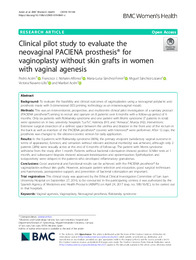Título :
Clinical pilot study to evaluate the neovaginal PACIENA prosthesis® for vaginoplasty without skin grafts in women with vaginal agenesis |
Autor :
Acién, Pedro 
Nohales-Alfonso, Francisco J.
Sánchez-Ferrer, María Luisa 
Sánchez-Lozano, Miguel
NAVARRO LILLO, VICTORIA
Acién, Maria Isabel  |
Editor :
BMC |
Departamento:
Departamentos de la UMH::Ingeniería Mecánica y Energía |
Fecha de publicación:
2019 |
URI :
https://hdl.handle.net/11000/33433 |
Resumen :
Background: To evaluate the feasibility and clinical outcomes of vaginoplasties using a neovaginal polylactic acid
prosthesis made with 3-dimensional (3D) printing technology as an intraneovaginal mould.
Methods: This was an interventionist, prospective, and multicentre clinical pilot investigation of a sanitary product
(PACIENA prosthesis®) aiming to recruit and operate on 8 patients over 6 months with a follow-up period of 6
months. Only six patients with Rokitansky syndrome and one patient with Morris syndrome (7 patients in total)
were operated on in two university hospitals: “La Fe”, Valencia (H1) and “Arrixaca”, Murcia (H2). Interventions:
Extensive surgical dissection of a defined space between the urethra and bladder in the front and of the rectum in
the back as well as insertion of the PACIENA prosthesis® covered with Interceed® were performed. After 12 days, the
prosthesis was changed to the silicone-covered version for daily application.
Results: In the 6 patients with Rokitansky syndrome (86%), the primary endpoint (satisfactory vaginal outcome in
terms of appearance, function, and sensation without relevant additional morbidity) was achieved, although only 2
patients (28%) were sexually active at the end of 6 months of follow-up. The patient with Morris syndrome
withdrew from the study after 1 month. Patients without bacterial colonization showed positive Schiller tests at 1
month, and subsequent biopsies showed adequate keratinization and epidermization. Epithelization and
iodopositivity were delayed in the patients who developed inflammatory granulomas.
Conclusions: Good anatomical and functional results can be achieved with the PACIENA prosthesis® for
vaginoplasties without skin grafts. However, adequate patient selection and education, good surgical techniques
and haemostasis, postoperative support, and prevention of bacterial colonization are important.
Trial registration: This clinical study was approved by the Ethical Clinical Investigation Committee of San Juan
University Hospital on September 27, 2016, to be conducted in the participating centres; it was authorized by the
Spanish Agency of Medicines and Health Products (AEMPS) on April 24, 2017 (exp. no. 585/16/EC), to be carried out
in that hospitals.
|
Palabras clave/Materias:
Vaginal agenesis
Vaginoplasty
Neovaginal prosthesis
Rokitansky syndrome |
Área de conocimiento :
CDU: Ciencias aplicadas: Ingeniería. Tecnología |
Tipo de documento :
info:eu-repo/semantics/article |
Derechos de acceso:
info:eu-repo/semantics/openAccess
Attribution-NonCommercial-NoDerivatives 4.0 Internacional |
DOI :
https://doi.org/10.1186/s12905-019-0841-z |
Publicado en:
BMC Women's Health (2019) 19:144 |
Aparece en las colecciones:
Artículos Ingeniería Mecánica y Energía
|
 La licencia se describe como: Atribución-NonComercial-NoDerivada 4.0 Internacional.
La licencia se describe como: Atribución-NonComercial-NoDerivada 4.0 Internacional.
.png)
